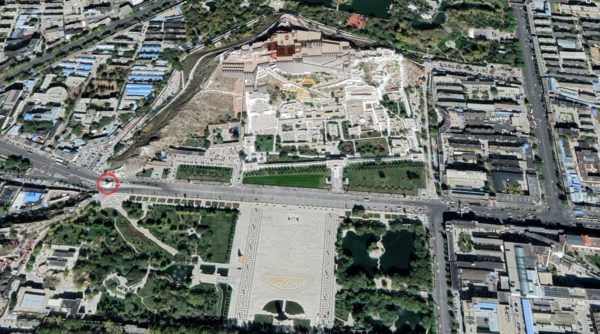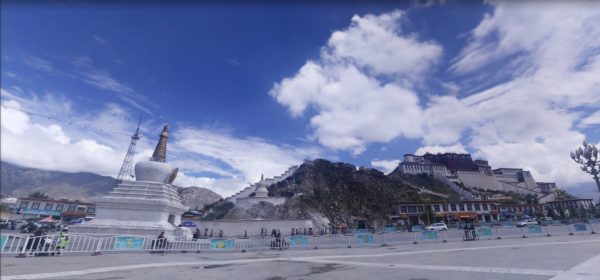Popular Tibetan singer Tsewang Norbu (Chinese: Caiwang Luobu) has reportedly self-immolated in the Tibetan capital of Lhasa on Feb. 25, 2022, leading to his death, according to Tibetan media reports. The International Campaign for Tibet had separately received information on his self-immolation but could not obtain any eyewitness account.
Some sources in Lhasa, citing indirect eyewitness accounts, told ICT that the singer did attempt self-immolation at the Barpokaling (Tibetan: བར་པོ་ཀ་ལིང་) stupa, which lies at the right corner in front of the iconic Potala Palace, the historical winter palace of the Dalai Lamas. Yet another source heard that the self-immolator poured gasoline on his body, but the police immediately took him away, possibly to a hospital. Tsewang reportedly died after the self-immolation, but our sources could not confirm his death. ICT will continue to monitor the situation.
With the “two sessions” of China’s national legislature and advisory body in progress in Beijing, Tibetan Uprising Day on March 10 and Tsewang’s reported self-immolation in late February, Lhasa is under heightened security with tight control on the flow of information. Authorities issued directives to relevant officials to be on duty in office even during the Losar (New Year) holidays that began on March 3, 2022.

Barpokaling stupa, site of Tsewang Norbu’s reported self-immolation, is circled red in this satellite image of the Potala Palace dated October 2021. Google Earth coordinates 29°39’19.63″N, 91°07’02.04″E

Street view of Barpokaling stupa on Google Earth
Complicating the absence of accurate information, ICT has seen that there is a disinformation campaign, most likely by state actors, to convolute information on the reported self-immolation by Tsewang. A graphic image of a severely burned individual on a hospital bed purporting to be that of Tsewang circulating in Lhasa was shared with exile contacts. On closer examination, the doctored image is that of a severely burned young man in Kritipur Hospital in Kathmandu, Nepal. According to Radio Free Asia Tibetan, comments on Tsewang’s account on Weibo (a Twitter-like Chinese social media app) were disabled due to an outpouring of condolences over his reported death, but the account is now reportedly fully functional again. Hours before his self-immolation, Tsewang posted on his Weibo and also liked a Warner Music Beijing’s Weibo post about his release of a new song.

Screenshots of Tsewang’s Weibo account with the last post at 11:59am on the day of his reported self-immolation. Images via RFA
By reportedly self-immolating, Tsewang becomes the 158th Tibetan in Tibet to have done so since 2009, and the first after Ngaba (Aba) native Yonten’s self-immolation in November 2019. Chinese authorities in Tibet have not issued any statement or comment to date on Tsewang’s reported self-immolation. In the past, Tibetan self-immolators had been variously labeled as outcasts, criminals and mentally ill. The Chinese authorities in Tibet are expected to label Tsewang along the same line.
Tsewang Norbu’s work and fame
The 25-year-old singer, who was born in 1996 in Nagchu (Chinese: Naqu), Tibet Autonomous Region, and was a graduate of Tibet University, was well-known all over Tibet for his fame in popular music.

Tsewang Norbu
His mother, Sonam Wangmo, is also well known for her music, having won the gold medal in China’s 10th CCTV National Singing Contest in 2002. She is best known for her authentic Tibetan folk singing style. Owing to her popularity, she was recruited into the “Song and Dance Troupe” of the General Political Department of China’s People’s Liberation Army. According to High Peaks Pure Earth, her 2005 album “Natural Born Song” also carried the infamous 1964 PLA propaganda tune, the “Laundry Song.”

Tsewang Norbu
Following in the footsteps of his mother, Tsewang also achieved fame by leaving his mark on Chinese reality television singing competitions akin to “The Voice” and “Idols.” Norbu’s music, catering to the current market demands, has a fusion content of Tibetan, Western and Chinese music and style. Besides the Tibetan imagery, the lyrics in his music has high artistic expressions of Tibetanness, belongingness and subtle nationalism. For instance, his song titled “Tsampa,” translated by China Studies Professor Timothy Grose (extract below) speaks of the traditional Tibetan staple diet as the source of strength, focus and hope for all Tibetans.
You match the color of the snow mountains
You match the color of the white Khata
You match the intentions of we Tibetans
You are [worthy] of the label green food
Your essence is to do no harm
Love and compassion fill your heart-mind
My strength was increased by you
My mental focus was provided by you
My each and every hope was bestowed by you
Completely bestowed by you
In another song titled “Let’s return to fatherland (ཕ་ཡུལ་ལ་ལོག་འགྲོ)” in praise of his native Nagchu, Tsewang expresses the suppressed sentiments of Tibetans amidst rapid urbanization and modernization to go back to their traditional way of living. Contrasting imagery of urbanization to that of pastoralism, he persuades the urbanizing Tibetans to take a break during the Tibetan New Year to go back to their home in the pastoral country as there is nothing happier than being in one’s fatherland. During his performance at the Sing China competition in 2021, the word Nagchu in the lyrics was changed to Tibet, thus broadening the sentiment across the whole of Tibet. A translation of an extract of the lyrics is below.
There is a land known as the fatherland
There is a happiness known as the home
There is a relation known as the parents
There is a gratitude known as compassion
As the Losar [Tibetan new year] is nearing
Buy that gift
Dress up
And Drive
Let’s return to the fatherland
Climb that hill
Cross that plain
Sing a song
The grassland is expansive
With plenty of wealth [livestock]
My heart is longing heavier for you
There is nothing happier than one’s fatherland
Three days prior to his reported self-immolation, Tsewang released a song titled “If you have any regret, do not hold it secretly for yourself,” written by the Sichuanese Zeng Jie and Qiu Shuyang. Seemingly a love song, some observers notice metaphorical messages in the title of the song. ICT’s translation of the lyrics is below.
The moment you put down your memories
Have made the last call and gone far away
Stumbling and saying that I’m not afraid
Left the hugging afterglows of the setting sun behind, the wind blew the hair
I’m somewhere in the city, listening to the chanting of the starry night
It is like a ray of sunlight, the warmth melts me
Putting away worries
If you have any regret, do not hold it secretly for yourself
We used to spend every spring and summer together
Look, time is running out
Time is full of colorful flowers in the depths
One flower is forever in my heart
Political connection
Born to artist parents (his mother a singer and father a music composer), Tsewang, however, has a maternal uncle Sogkhar Lodoe Gyatso, who is a long-serving Tibetan political prisoner. He is currently four years into his 18-year imprisonment for publishing a video message about declaring a world peace movement and marching around the Potala Palace in protest on Jan. 28, 2018.
Lodoe had already served 21 years in prison between 1993 to 2013. Cumulatively he will have served 39 years in prison at the end his current 18-year prison term. Originally sentenced to a 15-year prison term in 1993 for killing in self-defense during a fatal fight with a man whose speeding car had killed his sister Lharik, Lodoe carried out a political protest in the notorious Drapchi prison in 1995, leading to the conversion of his prison term to a death sentence. Owing to international outcry over his death sentence and torture in prison in addition to urgent appeals by the UN special rapporteur on extrajudicial, summary and arbitrary executions, his death sentence was later commuted to life imprisonment.
After release in 2013, Lodoe was again detained for a relatively short duration for his demonstrations in 2015 and 2016. His demonstration in January 2018 led to his current 18-year prison term.
Oppressive CCP policies in Tibet
Tsewang’s reported self-immolation in Lhasa comes amid an oppressive political environment and Chinese Communist Party policies targeting the Tibetans in his native Nagchu. Tibetans in Sog and Driru counties, particularly under the Nagchu Prefectural level City, have been reeling under brutal CCP oppression for a long time.
For the second year in a row, Freedom House has ranked Tibet as the least-free country in the world. The International Campaign for Tibet calls for the international community to hold China accountable for the atrocities it has perpetrated in Tibet.
Commenting on Tsewang’s self-immolation, Chinese dissident Wang Dan, in his opinion piece published on RFA on March 8, wrote:
“…the suffering and resistance lurking in society far exceed the outside world’s perception. When Tsewang Norbu conquered the hearts of many audiences with beautiful songs on the program “The Voice of China”, what we saw on the surface was a young man who was ready to embark on the road of singers and hoped to become a new idol artist; what he heard was his nostalgia for his family and land, love and nature’s yearning. But how many people could have thought at the time that this young man who looked like countless peers had such a blazing belief in his heart and courage to die for freedom. This can’t help but make us think about how many people in today’s China ostensibly obey the control of totalitarian politics and the social atmosphere of indifference to the philistine. In fact, we don’t know their inner anger and their determination to resist. For those who think that everyone on Chinese soil has been enslaved and everyone has given up resistance, the self-immolation should make them rethink.”

